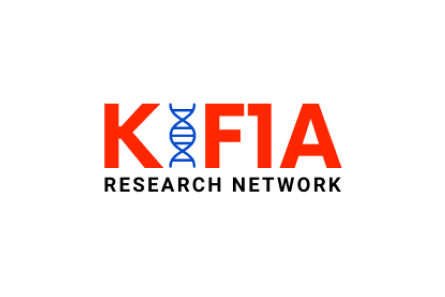KIF1A.ORG, Inc.
Cycle 1
KIF1A-Associated Neurological Disorder (KAND) is a severe and rare neurodegenerative disorder with a progressive course. KAND is caused by gain of function mutations in the KIF1A gene. The condition can affect both the brain and body, such as the eyes, muscles and nerves. There is a wide range of symptoms that appear at birth or in early childhood.
Last updated 04/30/2025
Clinical
Disease Class
Genetic diseases
Neurological diseases
Body Systems
Muscular / Skeletal
Nervous / Sensory
Organs
Bladder
Brain
Muscles
Nerves
Known Genetic Link
Yes, one or more genes directly cause the condition
causative_genes
KIF1A
contributory_genes
None specified / unknown
Type of Inheritance
Autosomal dominant
Autosomal recessive
De novo
Newborn Screening
Yes, in some states
Disease Mechanism(s)
Transport defect
Age of Onset
Adolescence (12-17)
Adulthood (age 18-64)
Early childhood (age 1+-5)
Elderly (age 65+)
Infancy (age 0-1)
Middle childhood (6-11)
Average Age at Diagnosis
Adolescence (12-17)
Adulthood (age 18-64)
Early childhood (age 1+-5)
Infancy (age 0-1)
Middle childhood (6-11)
Life Expectancy
Adolescence (12-17)
Adulthood (age 18-64)
Early childhood (age 1+-5)
Elderly (age 65+)
Infancy (age 0-1)
Middle childhood (6-11)
Affected Sex(es)
Female
Male
National Prevalence
1001-10000
Global Prevalence
10000+
National Incidence
Less than 10
Global Incidence
Less than 10
Symptoms / Phenotypes
abnormal brain features
developmental delay
exaggerated reflexes / hyperreflexia
hypertonia
hypotonia
intellectual disability
movement disorders / ataxia / tremor
muscle atrophy
neurogenic bladder
peripheral neuropathy
seizures / epilepsy
spastic paraplegia
speech delay
vision problems
Biomarkers
None
Existing Therapies
Expanded access (Compassionate Use)
Organizational & Research
Cell Lines
iPSCs
Cell Lines, Institution
Coriell Institute
Jackson Laboratories (JAX)
Cell Lines, Involvement
Consulted
Cell Lines, share
No
Disease Model
Mouse
Organoids
Disease Model, Involvement
Consulted
Disease Model, share
No
Clinical Trial Role
Outcome measures, development
Biobank, Institution
None
Center of Excellence, Institution
None
Registry
Yes, we have a registry that we created
Data Collected, Registry
Genetic data
Patient contact info
Data Entered by, Registry
Patients
Platform, Registry
Not specified
Natural History Study
Yes, we have collaborated on a natural history study
Data Collected, Natural History Study
Clinical endpoints (outcomes)
Electronic health records/electronic medical records
Genetic data
Imaging data
Medication usage
Patient-reported outcomes
Prospective data
Retrospective data
Platform, Natural History Study
Not specified
FDA Patient Listening Session
No
FDA Patient-Focused Drug Development (PFDD) Program
No
ICD Codes
No, we do not have any ICD codes
Diagnostic Guidelines
Yes, we have guidance available on our website
In the process of creating formal diagnostic guidelines for publication in a peer-reviewed journal
Science Advisory Board Policies
Does not have an SAB
Research Network Policies
Has CRN and willing to share policies
Research Roadmap
Yes we have a Research Roadmap, and will share policies
International Chapters
Asia
Europe
North America
International Partners
None
